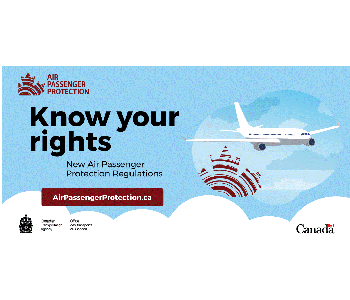Canadian travelers with sight loss have new legal rights when their air travel plans go awry. With the Airline Passenger Bill of Rights, which became law on July 15, 2019, Canadian airlines are required to adhere to new accessibility regulations.
These regulations apply to airlines, terminal operators, rail, ferries, interprovincial buses, Canadian Border Services Agency (CBSA) and the Canadian Air Transport Security Authority (CATSA).
Some of the new rules will be in place as of July 2019, while the rest won't be in effect until Dec. 15.
 What’s new about the regulations?
What’s new about the regulations?
Previously, airline companies and airport terminal operators only had to abide by a voluntary code of practice. This meant that while the federal government's rules spelled out many provisions about accessibility, the expectations were not enforceable.
These new regulations are now mandatory and give you more rights. Should a regulated entity or an individual be found not to have complied with the new regulations, an administrative penalty of up to $25,000 for a company or $5,000 for an individual may be assessed for each contravention.
Terminal operators and air terminals are expected to have personnel available to provide guiding assistance from curb to check-in. For anyone traveling with a guide dog, relieving areas will be available without the need to pass through security. This provision will apply to any renovations; terminals will not be expected to retrofit existing facilities.
Further, all service providers will be expected to make onboard entertainment systems accessible, and all service providers and terminal operators will be required to make their websites accessible.
As the regulations are new, many questions remain about enforcement procedures and how regulated entities will roll out the requirements. As before, the onus lies with the passenger to advise service providers of their accessibility requirements at least 48 hours in advance.
The full regulations are available online: http://www.gazette.gc.ca/rp-pr/p2/2019/2019-07-10/html/sor-dors244-eng.html
Read more articles from the September 2019 issue of Equalize:
- Call for National Elections Advocates/ Elections Accessibility
- Bill C-81 Royal Assent
- Know Your Rights
- Educate to Advocate – Empowering Advocacy Across Ontario
- CNIB Foundation releases The ABCs of iOS manual
- Tales of a Guide Dog Handler
- Deafblind Community Services etiquette session at the London Community Hub
- Ambassador spotlight: Guy Carriere meets his hero
- Have your say on making information accessible in Ontario
- Become a Guide Dog Champion!
